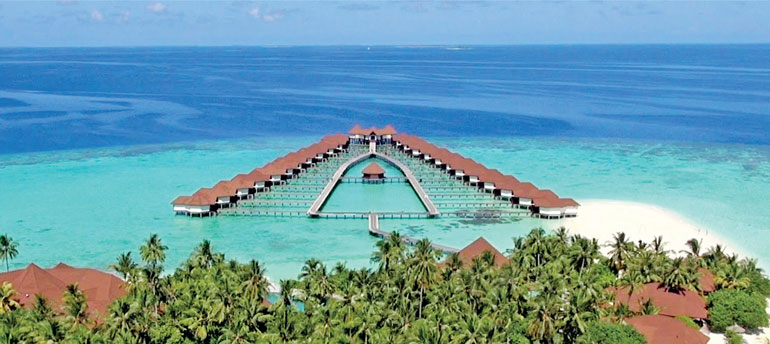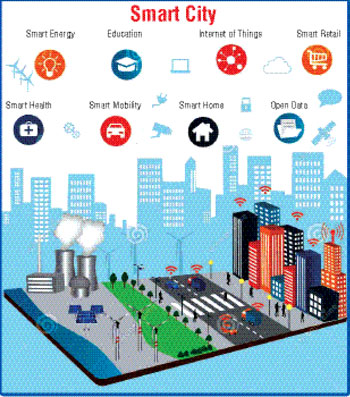Saturday Feb 21, 2026
Saturday Feb 21, 2026
Tuesday, 15 August 2017 00:01 - - {{hitsCtrl.values.hits}}
 With Sri Lanka gradually embracing the concepts of green and smart buildings in constructions, the people will find a whole new level of experience in interacting with buildings. Even though this element has somewhat just broken ground into Sri Lankan real estate and hospitality sectors, the concept of using Extra Low Voltage or ELV for smart building user experience and added value is nothing new in many other parts of the world.
With Sri Lanka gradually embracing the concepts of green and smart buildings in constructions, the people will find a whole new level of experience in interacting with buildings. Even though this element has somewhat just broken ground into Sri Lankan real estate and hospitality sectors, the concept of using Extra Low Voltage or ELV for smart building user experience and added value is nothing new in many other parts of the world.
To explain in layman terms, ELV is the mechanism of integrating siloed building services to understand the user expectations and experience intelligently. These services could include optical fibre networks, unified communication systems, building management systems, sensor networks, energy metering and surveillance systems to name just a few.
The final interaction with the users is provided via digital panels or mobile technology. One of the companies that has specialised in this form of ELV integration is V S Information Systems (better known as VSIS). With staff strength of more than 400+ and many of them with expertise in Software defined architectures and the Internet-of-Things (IoT). VSIS is in a unique position to deploy Smart Building ELV solutions.
Recently, VSIS successfully completed state-of-the-art ELV implementations for the Amari Havodda and the Orivaru Resorts in Maldives. Other large implementations are ongoing for Aarah Resort, Maldives as well as for an educational institute in Sri Lanka at the moment. Apart from the hospitality projects in Maldives, the company has also engaged in providing consultancy services for Cheval Blanc Randheli, a well-known, ultra-modern hotel.
“Nowadays, it’s all about user experience and many establishments today have started to recognise this aspect of smart, intelligent interaction with a building, which guarantees not only convenience and substantial energy savings but also the ability to demand more value for the property, in a very competitive industry,” said VSIS Director Kithsiri Gunasekara.
The company is also encouraging all companies in property development as well as corporate clients to opt for innovative ELV solutions to be a part of smart building and smart city eco-system in future. A smart building would bring in a lot of value to properties and will facilitate to generate new and innovative revenue streams for the real estate sector. When the aspects of Smart Cities are realised to a greater proportion, people inside a smart building can obtain the city services via a connection through a building’s smart ELV infrastructure.
Innovation in an evolving field such as construction is essential for considerable growth. While the hospitality sector has embraced this innovative approach in the ELV sector, it is also hoped that this innovation would inspire other sectors to follow suit. Further, customers would start seeing firsthand the convenience and cost savings as well as how positively it will impact their lifestyles very soon.
The hype behind ELV is ever-expanding
ELV includes all the systems in a building which operates on low voltages like telephone, data, LAN, CCTV, fire alarm, public address, access control, building management, digital signage and master clock systems to name a few. When integrated with solutions such as software defined architectures, Internet-of-Things (IoT), Big Data analytics and mobile technologies these systems can provide the foundations for a Smart, Intelligent Building. VSIS has also established a Briefing Centre and Customer Experience Centre where all aspects of smart ELV solutions can be witnessed firsthand by prospective clients.

Without properly designing ELV systems at the beginning of a construction, realising the benefits of a smart building may never be achieved. If not done properly, the entire building’s ELV infrastructure may have to be removed and done from scratch, which may not be feasible and probably may result in a sharp decrease in the building’s value. Around the world, smart cities and smart communities are becoming a norm and hence intelligent ELV solutions are turning into a mandatory requirement for newly constructed hotels, resorts, hospitals, airports and even schools.
An extraordinary journey through innovation
The VS Group has years of work under their name and extraordinary ones at that. VSIS, which is the company’s Information Technology arm was formed in 2009 and is today a Rs. 3 billion company with CIDA Grade 1 rated and ISO 9001:2015 certification. VSIS is a member of VS Group, which has diversified into manufacturing, sustainable energy and Information Technology. From inception, the group believed in increasing value addition inside the country.
Sticking to this belief, VSIS as a strategy for growth, moved into the business of Software Development, Digital Transformation and Clinical Research by way of either setting up new subsidiary companies or making investments. The group has successfully spread its design and operation of Hydro Projects into many East African Countries such as Kenya, Uganda and Tanzania and established a strong presence in these countries. Further, the group has established a turbine manufacturing plant, the only of its kind in Sri Lanka with German Collaboration about a decade ago.
At the recent Construction Expo 2017 which was held at the Bandaranaike Memorial International Conference Hall (BMICH), VSIS took part by showcasing the advantages of its solutions directly to the general public and educated prospective business clients on the dynamics behind smart building ELV systems and what it could do to brighten the country’s hospitality sector in years to come.